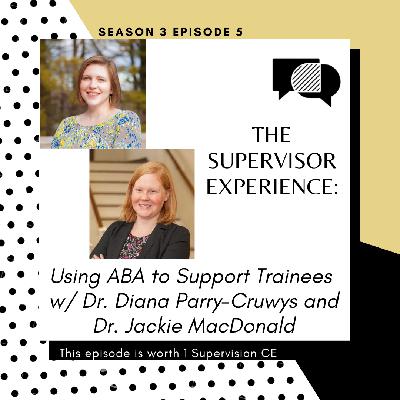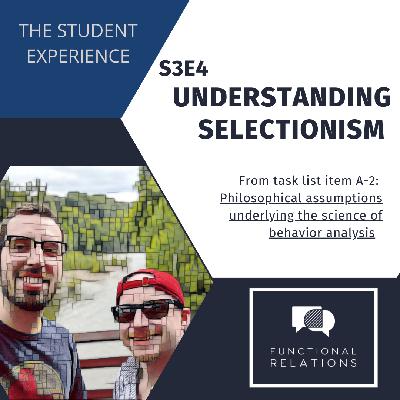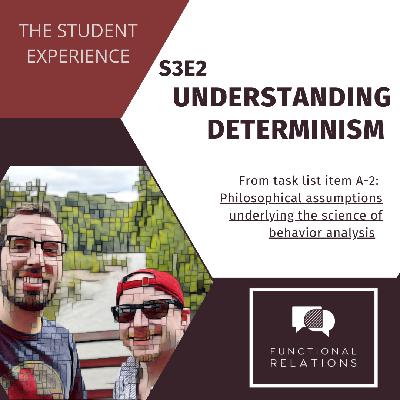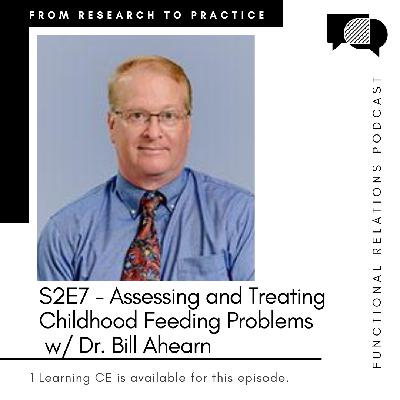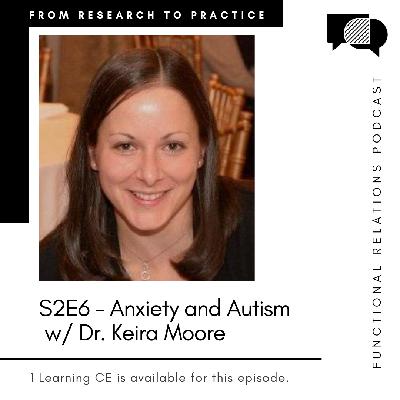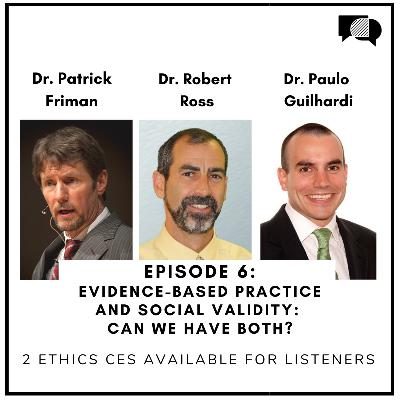Discover Functional Relations
Functional Relations

Functional Relations
Author: Zachary Bird, PhD, BCBA-D and Caleb Davis, PhD, BCBA-D
Subscribed: 114Played: 1,419Subscribe
Share
© 2025
Description
An ABA podcast where Dr. Zachary Bird and Dr. Caleb Davis set aside time to have engaging conversation with experts in the field of behavior analysis to explore topics like ethics of functional analysis, effective supervision practices, translating research to practice, and others.
BACB, IBAO, and QABA CEUs are available for listeners. To purchase, visit www.functionalrelationspodcast.com
To deliver social praise or aversive stimulation, you can email us at functionalrelationspodcast@gmail.com
BACB, IBAO, and QABA CEUs are available for listeners. To purchase, visit www.functionalrelationspodcast.com
To deliver social praise or aversive stimulation, you can email us at functionalrelationspodcast@gmail.com
41 Episodes
Reverse
In the fifth episode of Season 3, Zach and Caleb discuss updated fieldwork requirements and recent research on systems for promoting successful fieldwork experiences with Dr. Diana Parry-Cruwys and Dr. Jackie MacDonald. Season 3 of the Functional Relations podcast is titled "The Experience". Each episode will alternate between the supervisor experience and the trainee experience. 1 supervision learning CE is available for this episode. You can purchase it at https://www.functionalrelationspodcast.com If you feel that our podcast is a valuable contribution to the field of ABA, please consider supporting us on Patreon at https://www.patreon.com/functionalrelationspodcast Things to check out from the episode: BCBA Fieldwork Requirements: https://www.bacb.com/wp-content/uploads/2022-BCBA-Fieldwork-Standards_200501.pdf Ethics Code for Behavior Analysts: https://www.bacb.com/wp-content/uploads/2020/11/Ethics-Code-for-Behavior-Analysts-210902.pdf References: Parry-Cruwys, D., Atkinson, R., & MacDonald, J. (2021). Teaching Graduate Students to Identify and Adhere to Practicum Requirements. Behavior Analysis in Practice, 1-10. Parry-Cruwys, D., & MacDonald, J. (2021). Using Gamification to Promote Accurate Data Entry of Practicum Experience Hours in Graduate Students. Behavior Analysis in Practice, 14, 1-10.
In the fourth episode of Season 3, Zach and Caleb have a discussion to help students understand the concept of selectionism. Season 3 of the Functional Relations podcast is titled "The Experience". Each episode will alternate between the supervisor experience and the student experience. No CEs are available for this episode. If you feel that our podcast is a valuable contribution to the field of ABA, please consider supporting us at https://www.patreon.com/functionalrelationspodcast References: Catania, A. C. (2013). Learning (5th ed.). Cornwall on Hudson, NY: Sloan Publishing. Cooper, J. O., Heron, T. E., & Heward, W. L. (2020). Applied behavior analysis (3rd ed.). Upper Saddle River, NJ: Pearson. Pierce, W. D., & Cheney, C. D. (2017). Behavior analysis and learning: A biobehavioral approach. Routledge. Skinner, B. F. (1984). Selection by consequences. Behavioral and brain sciences, 7(4), 477-481.
In the third episode of Season 3, Zach and Caleb discuss ways to thoughtfully deliver feedback that may inspire new performances with Dr. Ellie Kazemi. Season 3 of the Functional Relations podcast is titled "The Experience". Each episode will alternate between the supervisor experience and the trainee experience. 1 supervision learning CE is available for this episode. You can purchase it at https://www.functionalrelationspodcast.com If you feel that our podcast is a valuable contribution to the field of ABA, please consider supporting us on Patreon at https://www.patreon.com/functionalrelationspodcast Things to check out from the episode: Dr. Kazemi's book on supervision: https://www.springerpub.com/fieldwork-and-supervision-for-behavior-analysts-9780826139122.html References: Daniels, A. C. (2000). Bringing out the best in people. McGraw-Hill Education. Daniels, A. C., & Bailey, J. S. (2014). Performance management: Changing behavior that drives organizational effectiveness . Atlanta, GA: Aubrey Daniels International. Multi-Tiered Systems of Support, 27. Kazemi, E., Rice, B., & Adzhyan, P. (2018). Fieldwork and supervision for behavior analysts: A handbook. Springer Publishing Company.
In the second episode of Season 3, Zach and Caleb have a discussion to help students understand the concept of determinism. Season 3 of the Functional Relations podcast is titled "The Experience". Each episode will alternate between the supervisor experience and the student experience. No CEs are available for this episode. If you feel that our podcast is a valuable contribution to the field of ABA, please consider supporting us at https://www.patreon.com/functionalrelationspodcast Things to check out from the episode: The Daily BA - I Didn't Know Her Circumstances w/ Pat Friman - https://youtu.be/MyClJpztOSs https://www.bacb.com/wp-content/uploads/2020/08/BCBA-task-list-5th-ed-210202.pdf References: Cooper, J. O., Heron, T. E., & Heward, W. L. (2020). Applied behavior analysis (3rd ed.). Upper Saddle River, NJ: Pearson. Friman, P. C. (2021). There is no such thing as a bad boy: The Circumstances View of problem behavior. Journal of Applied Behavior Analysis, 54(2), 636-653.
In the first episode of Season 3, Zach and Caleb discuss the process of becoming an effective supervisor with Dr. Tyra Sellers. Season 3 of the Functional Relations podcast is titled "The Experience". Each episode will alternate between the supervisor experience and the trainee experience. 1 supervision learning CE is available for this episode. You can purchase it at https://www.functionalrelationspodcast.com If you feel that our podcast is a valuable contribution to the field of ABA, please consider supporting us at https://www.patreon.com/functionalrelationspodcast Things to check out from the episode: Zach's work email address: zach@principledbehavior.com Send him an email if you're interested in learning more about the Behavior Consultant positions he has open at his company. (Apply here: https://www.indeed.com/job/behavior-consultant-bcba-or-bcaba-required-7a503db3fc859d63 ) References: Andzik, N. R., & Kranak, M. P. (2020). The softer side of supervision: Recommendations when teaching and evaluating behavior-analytic professionalism. Behavior Analysis: Research and Practice. Britton, L. N., & Cicoria, M. J. (2019). Remote fieldwork supervision for BCBA® trainees. Academic Press. Conners, B. M., & Capell, S. T. (Eds.). (2020). Multiculturalism and diversity in Applied Behavior Analysis: Bridging theory and application. Routledge. Garza, K. L., McGee, H. M., Schenk, Y. A., & Wiskirchen, R. R. (2018). Some tools for carrying out a proposed process for supervising experience hours for aspiring Board Certified Behavior Analysts®. Behavior analysis in practice, 11(1), 62-70. Kazemi, E., Rice, B., & Adzhyan, P. (2018). Fieldwork and supervision for behavior analysts: A handbook. Springer Publishing Company. Leland, W., & Stockwell, A. (2019). A self-assessment tool for cultivating affirming practices with transgender and gender-nonconforming (TGNC) clients, supervisees, students, and colleagues. Behavior analysis in practice, 12(4), 816-825. Sellers, T. P., Alai-Rosales, S., & MacDonald, R. P. (2016). Taking full responsibility: The ethics of supervision in behavior analytic practice. Behavior Analysis in Practice, 9(4), 299-308. Sellers, T. P., LeBlanc, L. A., & Valentino, A. L. (2016). Recommendations for detecting and addressing barriers to successful supervision. Behavior Analysis in Practice, 9(4), 309-319. Sellers, T. P., Valentino, A. L., Landon, T. J., & Aiello, S. (2019). Board certified behavior analysts' supervisory practices of trainees: Survey results and recommendations. Behavior analysis in practice, 12(3), 536-546. Sellers, T. P., Valentino, A. L., & LeBlanc, L. A. (2016). Recommended practices for individual supervision of aspiring behavior analysts. Behavior Analysis in Practice, 9(4), 274-286. Turner, L. B., Fischer, A. J., & Luiselli, J. K. (2016). Towards a competency-based, ethical, and socially valid approach to the supervision of applied behavior analytic trainees. Behavior Analysis in Practice, 9(4), 287-298. Valentino, A. L., LeBlanc, L. A., & Sellers, T. P. (2016). The benefits of group supervision and a recommended structure for implementation. Behavior analysis in practice, 9(4), 320-328. Wright, P. I. (2019). Cultural humility in the practice of applied behavior analysis. Behavior analysis in practice, 12(4), 805-809.
On June 1st 2021, Functional Relations returns with Season 3! In Season 3, Zach and Caleb will be focusing on the supervision experience. There will be two types of episodes. The first type will be for BCBAs interested in Supervision CEs. The second type will be for trainees who are looking for supplemental study content.
This episode Zach and Caleb discuss social interaction preference assessments with Dr. Casey Clay. 1 learning CE is available for this episode. You can purchase it at https://www.functionalrelationspodcast.com. If you feel that our podcast is a valuable contribution to the field of ABA, please consider supporting us at https://www.patreon.com/functionalrelationspodcast Things to check out from the episode: Dr. Clay has provided us with additional materials that can help us get started with running social interaction preference assessments. Click to download: Social interaction preference assessment slides/instructions Social interaction preference assessment data sheet Zach is hiring Behavior Consultants for his company (Principled Behavior Consultants) in Roanoke, VA. To learn more about the position visit https://principledbehavior.com/join-our-team/. If you're interested in joining the team email your resume to zach@principledbehavior.com. References: Call, N. A., Shillingsburg, M. A., Bowen, C. N., Reavis, A. R., & Findley, A. J. (2013). Direct assessment of preferences for social interactions in children with autism. Journal of applied behavior analysis, 46(4), 821-826. Clay, C. J., Samaha, A. L., Bloom, S. E., Bogoev, B. K., & Boyle, M. A. (2013). Assessing preference for social interactions. Research in Developmental Disabilities, 34(1), 362-371. Clay, C. J., Samaha, A. L., & Bogoev, B. K. (2018). Assessing preference for and reinforcing efficacy of components of social interaction in individuals with autism spectrum disorder. Learning and Motivation, 62, 4-14. Kelly, M. A., Roscoe, E. M., Hanley, G. P., & Schlichenmeyer, K. (2014). Evaluation of assessment methods for identifying social reinforcers. Journal of Applied Behavior Analysis, 47(1), 113-135. Morris, S. L., & Vollmer, T. R. (2019). Assessing preference for types of social interaction. Journal of applied behavior analysis, 52(4), 1064-1075. Morris, S. L., & Vollmer, T. R. (2020). A comparison of picture and GIF‐based preference assessments for social interaction. Journal of Applied Behavior Analysis. Nuernberger, J. E., Smith, C. A., Czapar, K. N., & Klatt, K. P. (2012). Assessing preference for social interaction in children diagnosed with autism. Behavioral Interventions, 27(1), 33-44. Wolfe, K., Kunnavatana, S. S., & Shoemaker, A. M. (2018). An investigation of a video-based preference assessment of social interactions. Behavior modification, 42(5), 729-746.
This episode Zach and Caleb talk to Dr. Bill Ahearn about his research and clinical work assessing and treating childhood feeding problems. 1 learning CE is available for this episode. You can purchase it at https://www.functionalrelationspodcast.com If you feel that our podcast is a valuable contribution to the field of ABA, please consider supporting us at https://www.patreon.com/functionalrelationspodcast Things to check out from the episode: Contact Dr. Ahearn directly with questions regarding feeding issues: bahearn@necc.org Zach is hiring Behavior Consultants for his company (Principled Behavior Consultants) in Roanoke, VA. To learn more about the position visit https://principledbehavior.com/join-our-team/. If you're interested in joining the team email your resume to zach@principledbehavior.com. References: Ahearn, W. H. (2001). Help! My son eats only macaroni and cheese: Dealing with feeding problems in children with autism. Making a difference: Behavioral intervention for autism, 51-73. Ahearn, W. H. (2003). Using simultaneous presentation to increase vegetable consumption in a mildly selective child with autism. Journal of applied behavior analysis, 36(3), 361-365. Ahearn, W. H., Castine, T., Nault, K., & Green, G. (2001). An assessment of food acceptance in children with autism or pervasive developmental disorder-not otherwise specified. Journal of autism and developmental disorders, 31(5), 505-511. Kedesdy, J. H., & Budd, K. S. (1998). Childhood feeding disorders: Biobehavioral assessment and intervention. Paul H Brookes Publishing. Maurice, C. E., Green, G. E., & Foxx, R. M. (2001). Making a difference: Behavioral intervention for autism. Pro-Ed. Wilder, D. A., Normand, M., & Atwell, J. (2005). Noncontingent reinforcement as treatment for food refusal and associated self‐injury. Journal of Applied Behavior Analysis, 38(4), 549-553. Williams, K. E., & Foxx, R. M. (2007). Treating eating problems of children with autism spectrum disorders and developmental disabilities: Interventions for professionals and parents. Pro-ed.
This episode Zach and Caleb talk to Dr. Keira Moore about her research and clinical work assessing and treating anxiety with individuals diagnosed with autism. 1 learning CE is available for this episode. You can purchase it at https://www.functionalrelationspodcast.com If you feel that our podcast is a valuable contribution to the field of ABA, please consider supporting us at https://www.patreon.com/functionalrelationspodcast Things to check out from the episode: Ways to learn more about Dr. Moore's consulting company and her upcoming continuing education events: Website: www.moorebehaviorconsulting.com Facebook: www.facebook.com/moorebehaviorconsulting Email her directly: keira@moorebehaviorconsulting.com YouTube video describing Constructional Aggression Training (CAT): https://youtu.be/XdnED053tDw References: Friman, P. C., Hayes, S. C., & Wilson, K. G. (1998). Why behavior analysts should study emotion: The example of anxiety. Journal of applied Behavior analysis, 31(1), 137-156. Skinner, B. F. (1965). Science and human behavior. Simon and Schuster. Sturmey, P. (Ed.). (2020). Functional analysis in clinical treatment. Academic Press.
This episode Zach and Caleb discuss teaching problem solving with Dr. Judah Axe. 1 learning CE is available for this episode. You can purchase it at https://www.functionalrelationspodcast.com. If you feel that our podcast is a valuable contribution to the field of ABA, please consider supporting us at https://www.patreon.com/functionalrelationspodcast References: Axe, J. B., Phelan, S. H., & Irwin, C. L. (2019). Empirical evaluations of Skinner's analysis of problem solving. The Analysis of Verbal Behavior, 35(1), 39-56. Frampton, S. E., & Alice Shillingsburg, M. (2018). Teaching children with autism to explain how: A case for problem solving?. Journal of Applied Behavior Analysis, 51(2), 236-254. Kieta, A. R., Cihon, T. M., & Abdel-Jalil, A. (2019). Problem solving from a behavioral perspective: Implications for behavior analysts and educators. Journal of Behavioral Education, 28(2), 275-300. Mann, C. C., & Karsten, A. M. (2020). Efficacy and social validity of procedures for improving conversational skills of college students with autism. Journal of Applied Behavior Analysis, 53(1), 402-421. Miguel, C. F. (2018). Problem-solving, bidirectional naming, and the development of verbal repertoires. Behavior Analysis: Research and Practice, 18(4), 340. Palmer, D. C. (1991). A behavioral interpretation of memory. Dialogues on verbal behavior, 261-279.
This episode Zach and Caleb discuss how to plan and lead more effective meetings with Dr. Linda LeBlanc. 1 learning CE is available for this episode. You can purchase it at https://www.functionalrelationspodcast.com If you feel that our podcast is a valuable contribution to the field of ABA, please consider supporting us at https://www.patreon.com/functionalrelationspodcast Things to check out from the episode: LeBlanc Behavioral Consulting - http://www.lbehavioral.com/home.html Inside JABA series from Behavioral Observations - https://behavioralobservations.com/the-inaugural-inside-jaba-series-session-102-with-drs-leblanc-st-peter-and-tiger/ https://whyy.org/episodes/how-to-run-a-good-meeting/ https://hbr.org/2020/02/how-to-create-the-perfect-meeting-agenda https://hbr.org/2019/01/why-your-meetings-stink-and-what-to-do-about-it https://www.nytimes.com/guides/business/how-to-run-an-effective-meeting References: LeBlanc, L. A., & Nosik, M. R. (2019). Planning and Leading Effective Meetings. Behavior Analysis in Practice, 12(3), 696-708.
This episode Zach and Caleb discuss research and clinical considerations regarding implementation of sleep treatments with Dr. Keira Moore. 1 learning CE is available for this episode. You can purchase it at https://www.functionalrelationspodcast.com If you feel that our podcast is a valuable contribution to the field of ABA, please consider supporting us at https://www.patreon.com/functionalrelationspodcast Things to check out from the episode: Download Dr. Hanley's Sleep Assessment and Treatment Tool for free: https://practicalfunctionalassessment.files.wordpress.com/2015/06/satt.pdf Ways to learn more about Dr. Moore's consulting company and her upcoming continuing education events: Website: www.moorebehaviorconsulting.com Facebook: www.facebook.com/moorebehaviorconsulting Email her directly: keira@moorebehaviorconsulting.com References: Blampied, N. M., & France, K. G. (1993). A behavioral model of infant sleep disturbance. Journal of applied behavior analysis, 26(4), 477-492. Friman, P. (2010). Good Night, Sweet Dreams, I Love You - Now Get Into Bed and Go to Sleep!. (n.p.): Boys Town Press. Friman, P. C., Hoff, K. E., Schnoes, C., Freeman, K. A., Woods, D. W., & Blum, N. (1999). The bedtime pass: An approach to bedtime crying and leaving the room. Archives of pediatrics & adolescent medicine, 153(10), 1027-1029. Jin, C. S., Hanley, G. P., & Beaulieu, L. (2013). An individualized and comprehensive approach to treating sleep problems in young children. Journal of Applied Behavior Analysis, 46(1), 161-180. Kuhn, B. R., & Weidinger, D. (2000). Interventions for infant and toddler sleep disturbance: A review. Child & Family Behavior Therapy, 22(2), 33-50. Piazza, C. C., & Fisher, W. (1991). A faded bedtime with response cost protocol for treatment of multiple sleep problems in children. Journal of Applied Behavior Analysis, 24(1), 129-140. Walker, M. (2017). Why we sleep: Unlocking the power of sleep and dreams. Simon and Schuster.
This episode Zach and Caleb discuss research and considerations regarding the delivery of telehealth services with Dr. Kelly Schieltz. 1 FREE learning CE is available for this episode. You can "purchase" them at https://www.functionalrelationspodcast.com If you feel that our podcast is a valuable contribution to the field of ABA, please consider supporting us at https://www.patreon.com/functionalrelationspodcast Things to check out from the episode: Center for Connected Health Policy: https://www.cchpca.org References: Barretto, A., Wacker, D. P., Harding, J., Lee, J., & Berg, W. K. (2006). Using telemedicine to conduct behavioral assessments. Journal of applied behavior analysis, 39, 333-340. Fisher, W. W., Luczynski, K. C., Hood, S. A., Lesser, A. D., Machado, M. A., & Piazza, C. C. (2014). Preliminary findings of a randomized clinical trial of a virtual training program for applied behavior analysis technicians. Research in Autism Spectrum Disorders, 8, 1044-1054. Lee, J. F., Schieltz, K. M., Suess, A. N., Wacker, D. P., Romani, P. W., Lindgren, S. D., ... & Dalmau, Y. C. P. (2015). Guidelines for developing telehealth services and troubleshooting problems with telehealth technology when coaching parents to conduct functional analyses and functional communication training in their homes. Behavior Analysis in Practice, 8, 190-200. Lerman, D.C., O'Brien, M.J., Neely, L. et al. Remote Coaching of Caregivers via Telehealth: Challenges and Potential Solutions. J Behav Educ (2020). Lindgren, S., Wacker, D., Suess, A., Schieltz, K., Pelzel, K., Kopelman, T., ... & Waldron, D. (2016). Telehealth and autism: Treating challenging behavior at lower cost. Pediatrics, 13, S167-S175. Machalicek, W., O'Reilly, M. F., Rispoli, M., Davis, T., Lang, R., Franco, J. H., & Chan, J. M. (2010). Training teachers to assess the challenging behaviors of students with autism using video tele-conferencing. Education and Training in Autism and Developmental Disabilities, 203-215. Pollard, J. S., Karimi, K. A., & Ficcaglia, M. B. (2017). Ethical considerations in the design and implementation of a telehealth service delivery model. Behavior Analysis: Research and Practice, 17(4), 298. Romani, P. W., & Schieltz, K. M. (2017). Ethical considerations when delivering behavior analytic services for problem behavior via telehealth. Behavior Analysis: Research and Practice, 17(4), 312. Singh, N. N. (Ed.). (2016). Handbook of evidence-based practices in intellectual and developmental disabilities. Springer. Suess, A. N., Wacker, D. P., Schwartz, J. E., Lustig, N., & Detrick, J. (2016). Preliminary evidence on the use of telehealth in an outpatient behavior clinic. Journal of Applied Behavior Analysis, 49, 686-692. Wacker, D. P., Lee, J. F., Dalmau, Y. C. P., Kopelman, T. G., Lindgren, S. D., Kuhle, J., ... & Waldron, D. B. (2013). Conducting functional communication training via telehealth to reduce the problem behavior of young children with autism. Journal of developmental and physical disabilities, 25, 35-48. Wacker, D. P., Lee, J. F., Dalmau, Y. C. P., Kopelman, T. G., Lindgren, S. D., Kuhle, J., ... & Waldron, D. B. (2013). Conducting functional analyses of problem behavior via telehealth. Journal of applied behavior analysis, 46, 31-46.
In the first episode in the "From Research to Practice" themed Season 2, Zach and Caleb discuss parent training. They are joined by Dr. Karen Bearss to discuss the RUBI parent training system. 1 Learning CE is available for this episode. You can purchase them at https://www.functionalrelationspodcast.com If you feel that our podcast is a valuable contribution to the field of ABA, please consider supporting us at https://www.patreon.com/functionalrelationspodcast Things to check out from the episode: https://www.rubinetwork.org/ Buy the RUBI curriculum: https://global.oup.com/academic/product/parent-training-for-disruptive-behavior-9780190627843 Attend a RUBI webinar with Dr. Bearss: https://abacnj.com/rubi-webinars/ References: Bearss, K., Burrell, T. L., Stewart, L., & Scahill, L. (2015). Parent training in autism spectrum disorder: What's in a name?. Clinical child and family psychology review, 18(2), 170-182. Bearss, K., Johnson, C., Smith, T., Lecavalier, L., Swiezy, N., Aman, M., ... & Sukhodolsky, D. G. (2015). Effect of parent training vs parent education on behavioral problems in children with autism spectrum disorder: a randomized clinical trial. Jama, 313(15), 1524-1533. Postorino, V., Sharp, W. G., McCracken, C. E., Bearss, K., Burrell, T. L., Evans, A. N., & Scahill, L. (2017). A systematic review and meta-analysis of parent training for disruptive behavior in children with autism spectrum disorder. Clinical Child and Family Psychology Review, 20(4), 391-402.
On April 1st, Functional Relations is back with Season 2! The theme for Season 2 is "From Research to Practice". The show is hosted by Zachary Bird, PhD, BCBA-D and Caleb Davis, MS, BCBA. You can visit us on Facebook, Instagram, Youtube, or www.functionalrelationspodcast.com. Let's do this!
This episode Zach and Caleb discuss the ethics surrounding the balance of social validity with empirically-supported interventions. They are joined by Dr. Pat Friman, Dr. Bob Ross, and Dr. Paulo Guilhardi. 2 Ethics CEs are available for this episode. You can purchase them at https://www.functionalrelationspodcast.com If you feel that our podcast is a valuable contribution to the field of ABA, please consider supporting us at https://www.patreon.com/functionalrelationspodcast Things to check out from the episode: BACB Professional and Ethical Compliance Codes- 2.09, 4.01, 4.03, 4.06, 4.07, 6.02 https://www.bacb.com/wp-content/uploads/BACB-Compliance-Code-english_190318.pdf Literature on "therapeutic alliance" and "delivering bad news". References: Allen, K. D., & Warzak, W. J. (2000). The problem of parental nonadherence in clinical behavior analysis: Effective treatment is not enough. Journal of Applied Behavior Analysis, 33, 373-391. Bannerman, D. J., Sheldon, J. B., Sherman, J. A., & Harchik, A. E. (1990). Balancing the right to habilitation with the right to personal liberties: The rights of people with developmental disabilities to eat too many doughnuts and take a nap. Journal of Applied Behavior Analysis, 23, 79-89. Lang, R., O'Reilly, M., Healy, O., Rispoli, M., Lydon, H., Streusand, W., ... & Didden, R. (2012). Sensory integration therapy for autism spectrum disorders: A systematic review. Research in Autism Spectrum Disorders, 6, 1004-1018. Leaf, J. B., Oppenheim-Leaf, M. L., Leaf, R. B., Taubman, M., McEachin, J., Parker, T., ... & Mountjoy, T. (2015). What is the proof? A methodological review of studies that have utilized social stories. Education and Training in Autism and Developmental Disabilities, 50, 127.Wolf, M. M. (1978). Social validity: The case for subjective measurement or how applied behavior analysis is finding its heart. Journal of Applied Behavior Analysis, 11, 203-214.
This episode Zach and Caleb discuss the ethics surrounding the use of social media. They are joined by Dr. Amanda Kelly (Behaviorbabe) and Dr. Megan Miller (#DoBetter). 2 Ethics CEs are available for this episode. You can purchase them at https://www.functionalrelationspodcast.com To further support us, check out our silly video at https://www.patreon.com/functionalrelationspodcast Things to check out from the episode: BACB Professional and Ethical Compliance Codes- 1.06, 8.0 https://www.bacb.com/wp-content/uploads/BACB-Compliance-Code-english_190318.pdf References: Kelly, M. P., Martin, N., Dillenburger, K., Kelly, A. N., & Miller, M. M. (2019). Spreading the news: History, successes, challenges and the ethics of effective dissemination. Behavior Analysis in Practice, 12, 440-451. O'Leary, P. N., Miller, M. M., Olive, M. L., & Kelly, A. N. (2017). Blurred lines: Ethical implications of social media for behavior analysts. Behavior Analysis in Practice, 10, 45-51.
This episode Zach and Caleb discuss the ethics surrounding the use of punishment and implications for some often-used procedures (e.g., DRO or positive practice). They are joined by Dr. Joshua Jessel, Dr. Robert Ross, and Dr. Paulo Guilhardi. 2 Ethics CEs are available for this episode. You can purchase them at https://www.functionalrelationspodcast.com To further support us, check out our silly video at https://www.patreon.com/functionalrelationspodcast Things to check out from the episode: BACB Professional and Ethical Compliance Codes- 4.08, 4.09 https://www.bacb.com/wp-content/uploads/BACB-Compliance-Code-english_190318.pdf References: Campbell, B. A., & Church, R. M. (1969). Punishment and aversive behavior. Appleton-Century-Crofts and Fleschner Publishing Company. Catania, A. C. (2007). Learning (interim 4th ed.). Cornwall-on-Hudson, NY: Sloan. Church, R. M. (1963). The varied effects of punishment on behavior. Psychological Review, 70, 369. Greene, R. J., & Hoats, D. L. (1971). Aversive tickling: A simple conditioning technique. Behavior Therapy. Honig, W. K. (1966). Operant behavior: Areas of research and application. Jessel, J., & Ingvarsson, E. T. (2016). Recent advances in applied research on DRO procedures. Journal of Applied Behavior Analysis, 49, 991-995. Jessel, J., Ingvarsson, E. T., Metras, R., Kirk, H., & Whipple, R. (2018). Achieving socially significant reductions in problem behavior following the interview‐informed synthesized contingency analysis: A summary of 25 outpatient applications. Journal of Applied Behavior Analysis, 51, 130-157. Kazdin, A. E. (1997). Parent management training: Evidence, outcomes, and issues. Journal of the American Academy of Child & Adolescent Psychiatry, 36, 1349-1356. Lerman, D. C., & Toole, L. M. (2011). Developing function-based punishment procedures for problem behavior. Handbook of Applied Behavior Analysis, 335-347.
This episode Zach and Caleb discuss the ethics surrounding the use of escape extinction and alternative procedures. They are joined by Dr. Megan Miller and Dr. Pat Friman. 2 Ethics CEs are available for this episode. You can purchase them at https://www.functionalrelationspodcast.com To further support us, check out our silly video at https://www.patreon.com/functionalrelationspodcast Things to check out from the episode: #Do Better Movement - https://www.facebook.com/groups/dobettermovement/ BACB Professional and Ethical Compliance Codes- 2.09, 4.02, 4.09 https://www.bacb.com/wp-content/uploads/BACB-Compliance-Code-english_190318.pdf The 7 Steps of Earning Instructional Control (2014) by Robert Schramm and Megan Miller References: Ala'i-Rosales, S., Cihon, J. H., Currier, T. D., Ferguson, J. L., Leaf, J. B., Leaf, R., ... & Weinkauf, S. M. (2019). The Big Four: Functional Assessment Research Informs Preventative Behavior Analysis. Behavior analysis in practice, 12, 222-234. Allen, K. D., & Warzak, W. J. (2000). The problem of parental nonadherence in clinical behavior analysis: Effective treatment is not enough. Journal of Applied Behavior Analysis, 33, 373-391. Fisher, W., Piazza, C., Cataldo, M., Harrell, R., Jefferson, G., & Conner, R. (1993). Functional communication training with and without extinction and punishment. Journal of Applied Behavior Analysis, 26, 23-36. Jones, K. M., & Friman, P. C. (1999). A case study of behavioral assessment and treatment of insect phobia. Journal of Applied Behavior Analysis, 32, 95-98. Geiger, K. B., Carr, J. E., & LeBlanc, L. A. (2010). Function-based treatments for escape-maintained problem behavior: A treatment-selection model for practicing behavior analysts. Behavior Analysis in Practice, 3, 22-32. Hoch, H., McComas, J. J., Thompson, A. L., & Paone, D. (2002). Concurrent reinforcement schedules: Behavior change and maintenance without extinction. Journal of Applied Behavior Analysis, 35, 155-169. Piazza, C. C., Moes, D. R., & Fisher, W. W. (1996). Differential reinforcement of alternative behavior and demand fading in the treatment of escape‐maintained destructive behavior. Journal of Applied Behavior Analysis, 29, 569-572. Piazza, C. C., Fisher, W. W., Hanley, G. P., Remick, M. L., Contrucci, S. A., & Aitken, T. L. (1997). The use of positive and negative reinforcement in the treatment of escape‐maintained destructive behavior. Journal of Applied Behavior Analysis, 30, 279-298. Ringdahl, J. E., Kitsukawa, K., Andelman, M. S., Call, N., Winborn, L., Barretto, A., & Reed, G. K. (2002). Differential reinforcement with and without instructional fading. Journal of Applied Behavior Analysis, 35, 291-294. Ward, S. (2013). Teaching good learner repertoires. Ward, S., Parker, A., & Perdikaris, A. (2017). Task as reinforcer: A reactive alternative to traditional forms of escape extinction. Behavior analysis in practice, 10, 22-34.
This episode Zach and Caleb discuss the ethics surrounding the use of functional analysis. They are joined by Dr. SungWoo Kahng and Dr. Sarah Bloom. 2 Ethics CEs are available for this episode. You can purchase them at https://www.functionalrelationspodcast.com To further support us, check out our silly video at https://www.patreon.com/functionalrelationspodcast Things to check out from the episode: UPDATE ABOUT FA MANUAL: After recording this episode, Dr. Kahng sent along this reference to a recently published functional analysis manual. Check it out! Chok, J. T., Harper, J. M., Weiss, M. J., Bird, F. L., & Luiselli, J. K. (2019). Functional analysis: A practitioner's guide to implementation and training. London: Elsevier. References: BACB Professional and Ethical Compliance Codes - 1.01, 2.09, and 3.01 https://www.bacb.com/wp-content/uploads/BACB-Compliance-Code-english_190318.pdf Bijou, S. W., Peterson, R. F., & Ault, M. H. (1968). A method to integrate descriptive and experimental field studies at the level of data and empirical concepts. Journal of applied behavior analysis, 1, 175-191. Bloom, S. E., Iwata, B. A., Fritz, J. N., Roscoe, E. M., & Carreau, A. B. (2011). Classroom application of a trial‐based functional analysis. Journal of Applied Behavior Analysis, 44, 19-31. Hanley, G. P. (2012). Functional assessment of problem behavior: Dispelling myths, overcoming implementation obstacles, and developing new lore. Behavior Analysis in Practice, 5, 54-72. Hanley, G. P., Jin, C. S., Vanselow, N. R., & Hanratty, L. A. (2014). Producing meaningful improvements in problem behavior of children with autism via synthesized analyses and treatments. Journal of Applied Behavior Analysis, 47, 16-36. Hanley, G. P., Iwata, B. A., & Thompson, R. H. (2001). Reinforcement schedule thinning following treatment with functional communication training. Journal of Applied Behavior Analysis, 34(1), 17-38. Iwata, B. A., Dorsey, M. F., Slifer, K. J., Bauman, K. E., & Richman, G. S. (1994). Toward a functional analysis of self‐injury. Journal of applied behavior analysis, 27, 197-209. Iwata, B. A., Vollmer, T. R., & Zarcone, J. R. (1990). The experimental (functional) analysis of behavior disorders: Methodology, applications, and limitations. In A. C. Repp & N. N. Singh (Eds.), Perspectives on the use of nonaversive and aversive interventions for persons with developmental disabilities (pp. 301-330). Sycamore, IL, US: Sycamore Publishing Company. Kahng, S., Hausman, N. L., Fisher, A. B., Donaldson, J. M., Cox, J. R., Lugo, M., & Wiskow, K. M. (2015). The safety of functional analyses of self‐injurious behavior. Journal of applied behavior analysis, 48, 107-114. Oliver, A. C., Pratt, L. A., & Normand, M. P. (2015). A survey of functional behavior assessment methods used by behavior analysts in practice. Journal of Applied Behavior Analysis, 48, 817-829. Roscoe, E. M., Phillips, K. M., Kelly, M. A., Farber, R., & Dube, W. V. (2015). A statewide survey assessing practitioners' use and perceived utility of functional assessment. Journal of Applied Behavior Analysis, 48(4), 830-844. Schlinger Jr, H. D., & Normand, M. P. (2013). On the origin and functions of the term functional analysis. Journal of Applied Behavior Analysis, 46, 285-288. Sigafoos, J., & Saggers, E. (1995). A discrete-trial approach to the functional analysis of aggressive behaviour in two boys with autism. Australia and New Zealand Journal of Developmental Disabilities, 20, 287-297. Smith, R. G., & Churchill, R. M. (2002). Identification of environmental determinants of behavior disorders through functional analysis of precursor behaviors. Journal of Applied Behavior Analysis, 35, 125-136. Smith, C. M., Smith, R. G., Dracobly, J. D., & Pace, A. P. (2012). Multiple‐respondent anecdotal assessments: An analysis of interrater agreement and correspondence with analogue assessment outcomes. Journal of applied behavior analysis, 45, 779-795. Thomason‐Sassi, J. L., Iwata, B. A., Neidert, P. L., & Roscoe, E. M. (2011). Response latency as an index of response strength during functional analyses of problem behavior. Journal of Applied Behavior Analysis, 44, 51-67.


